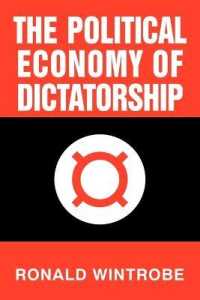- ホーム
- > 洋書
- > 英文書
- > Business / Economics
Full Description
Climate justice requires sharing the burdens and benefits of climate change and its resolution equitably and fairly. It brings together justice between generations and justice within generations. In particular it requires that attempts to address justice between generations through various interventions designed to curb greenhouse emissions today do not end up creating injustice in our time by hurting the currently poor and vulnerable. The United Nations Sustainable Development Goals (SDGs) summit in September 2015, and the Conference of Parties (COP) to the Framework Convention on Climate Change in Paris in December 2015, brought climate change and its development impact centre stage in global discussions.
In the run up to Paris, Mary Robinson, former President of Ireland and UN Secretary General's Special Envoy for Climate Change, instituted the Climate Justice Dialogue "to mobilize political will and creative thinking to shape an ambitious and just international climate agreement in 2015". The editors of this volume, an economist and a philosopher, served on the High Level Advisory Committee of the Climate Justice Dialogue. They noted the overlap and mutual enforcement between the economic and philosophical discourses on climate justice. But they also noted the great need for these strands to come together to support the public and policy discourse. Climate Justice: Integrating Economics and Philosophy is the result.
Bringing together contributions from economists and philosophers, Climate Justice illustrates the different approaches, how they overlap and interact, and what they have already learned from each other and might still have to learn.
Contents
1: Ravi Kanbur and Henry Shue: Climate Justice: Integrating Economics and Philosophy
2: Julie Rozenberg and Stephane Hallegatte: Poor People on the Front Line: The Impacts of Climate Change on Poverty in 2030
3: Michael Jakob, Ottmar Edenhofer, Ulrike Kornek, Dominic Lenzi, and Jan Minx.: Governing the Commons to Promote Global Justice: Climate Change Mitigation and Rent Taxation
4: Adam Rose, Dan Wei, and Antonio Bento: Equity Implications of the COP21 Intended Nationally Determined Contributions to Reduce Greenhouse Gas Emissions
5: Nicole Hassoun and Anders Herlitz: Climate Change and Inequity: How to Think about Inequities in Different Dimensions
6: Julie Nelson: Climate Change and Economic Self-Interest
7: Anja Karnein: Noncompliers' Duties
8: Alex Lenferna: Divest-Invest: A Moral Case for Fossil Fuel Divestment
9: Simon Caney: Justice and Posterity
10: Matthew Rendall: Discounting and the Paradox of the Indefinitely Postponed Splurge
11: Eugen Pissarskoi: The Controllability Precautionary Principle: Justification of a Climate Policy Goal under Uncertainty
12: Paul Kelleher: The Social Cost of Carbon from Theory to Trump
13: John Nolt: Long-term Climate Justice
Appendix: Declaration on Climate Justice








